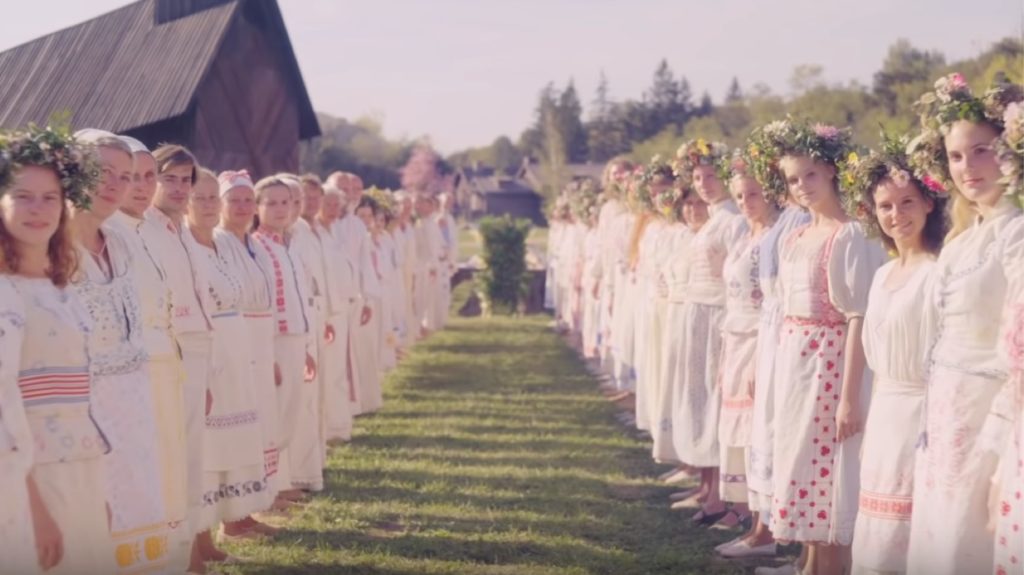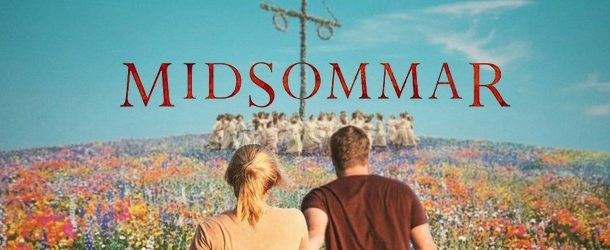If art is a product of the inner psyche of the artist, then director Ari Aster must have some real issues. He divided audiences with 2018’s Hereditary. That movie just happened to be my favorite film of the year, but I can safely say that it’s a one-time watch. No need to revisit it, just to make sure you can keep your soul and heart whole.
Now, just one year later, he takes the drama from the dark household dealing with grief to the brightest and eerily-cheery valley in the Swedish hills.
While there is a small central cast of college-aged kids, the film centers around a couple that is already on the shakiest ground when the movie is in motion. Dani (Florence Pugh) has been invited by her boyfriend, Christian (Jack Reynor) to a summer retreat with his roommates to attend the once-every-century Midsommar festival in Sweden. The festival is odd from the get-go, as every denizen can do little more than smile and be uncomfortably accommodating.

Though this movie won’t stop at being an anthropological study into an off-kilter pagan festival. Within a short amount of time, the visitors experience far more than they volunteered for and even become a part of the tradition.
Aster is a director that has the potential for absolute greatness (and has already achieved it, in my opinion). He’s clearly an indie guy and I hope he sticks to this genre and format for a time. He knows how to set a scene to get your attention. He then tests your attention level by stretching out scenes beyond what is needed in a typical movie. He has seemingly mastered the ability to offset the viewer’s mood with subtlety, just so much that you know you’re feeling anxiety, but don’t feel enough to be overwhelmed. You want your anxiety to have closure, and that’s exactly what Aster is counting on.
The other interesting part is that Midsommar breaks every cinematic rule. I don’t think the audience is meant to sympathize with one major character. We are simply meant to witness a group of people, none too perfect to be an anchor, be stuck in a daytime nightmare.
Most of the narrative follows Florence Pugh’s Dani. She already suffers with crippling mental illness and what she goes through seems to be beating a dead horse (Not a scene, I promise). She is entirely believable in a role that requires the depths of despair, curiosity and dread. Midsommar is her story even when you wish it wouldn’t be anyone’s. We’re along the ride with her, but the entire experience feels overly claustrophobic, even when it seems the characters could run at any time. We’re just as glued to the experience as they are.
Now, I could go on about the artistic craft of Midsommar and how Aster is mastering the slow burn not-quite-horror genre. However, there is only a select group of people I could recommend this film to. While the 2 hours 20 minutes is a slow-moving experiment in rising dread, it has a small handful of extremely graphic moments that will turn away a casual horror fan. Even me, with all my years of being desensitized, was shocked and sat there incredulous at some avenues the movie dared to go.
I’m split on my experience with Midsommar. It will be one of the few movies that I’ll remember at the end of the year. Though, I will never watch it again. It’s a brilliantly-crafted, soul-withering, and sometimes even funny experience. Midsommar is a ride that only deep genre fans will enjoy. I have to give this a high grade because it delivers everything it promised and more. I have to drop it a full grade because it’s almost inaccessible. B









Comments are closed.